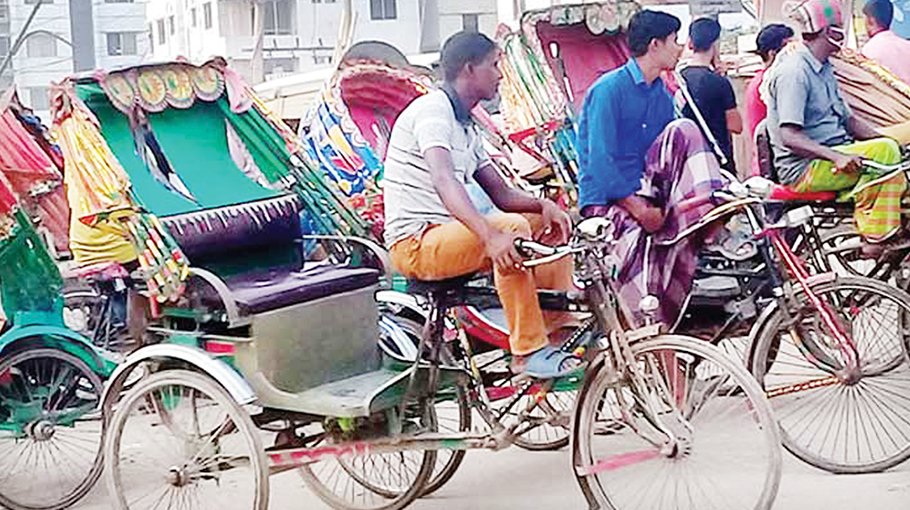Battery-powered rickshaws: Part-2
How do they manage?

Despite the High Court ban, these battery-powered rickshaws are still running in the capital and elsewhere in the country, managing influential political leaders and police.
That is why many illegal battery-powered rickshaws and three-wheeler autos ply across the country with little or no resistance from traffic staff.
The number of battery-operated rickshaws is increasing daily as there is no physical labour involved.
Physically challenged or handicapped persons are allowed to use battery-operated rickshaws for earning. But others are using this opportunity unethically.
After investigation, it is known that several powerful syndicates are behind the movement of the battery-operated rickshaws. This syndicate comprises local political leaders, extortionists, and some unscrupulous policemen.
It is also alleged that some leaders of the ruling party’s associate organisation Sramik League are involved in the motorised rickshaw trade. Sobuj Mia, a battery-operated rickshaw driver in Nandipara under
Sabujbagh police station of the capital, said that he has to pay Tk1000 every month to the people of the local leaders. In return, a sticker is affixed to the rickshaw. The validity of this sticker is one month.
“If there is a sticker, the police do not say anything to them. If not, the police sent those for dumping. It takes Tk 2,000-3,000 to get back those from there,” he added.
Sobuj claims that a syndicate of some leaders controls these battery rickshaws. Each leader has a symbol on the sticker. From which it can be understood that this rickshaw is under a person. The leaders through their people withdraw money and pay Tk 10 lakh to the police station every month.
Sobuj said, “If there are 100 battery rickshaws in each garage, Tk 1 lakh is collected from each garage. What comes out of the garage can be given to the police station. There are at least 500 garages under Sabujbagh police station. Do you calculate now?”
Another driver, Kashem Sarker, said the same thing as Sobuj. He said “Earlier, there were no stickers. The police used to stop our rickshaw time to time. Later, they were released by paying Tk 500 to Tk 1000. Now because of the sticker system, these problems are reducing.”
“However, if anyone was impolite to the police, he was detained. Later, he has to pay money to get rid of it,” he added.
Battery-powered three-wheeler autos do not have stickers. These are called line vehicles. A route is for a certain distance. Like a line from Nandipara Bridge to Bishwa road (Atish Dipankar Road), Nandipara Bridge to Shekergaon, Nandipara Bridge to Trimohani. No one can cross anyone’s line.
200-300 three-wheeler autos are moving on each of these lines. Tk 170 to Tk 350 per day is withdrawn from each three-wheeler auto, which the people of the relevant controlling leader take up. A part of it goes to the police station. It is known that lakhs of taka have to be paid daily from each line to the police station.
During the investigation, it came to know that Sohrab Gong in Kamrangirchar-Hazaribagh area, Andu Bahini in Pallabi area, Shahjahan in Rupnagar area, Ibrahim in Bhasantek area, Amir in Khilgaon area, Shapon in Goran, Mugda and Manda areas, Hijra Shobnom and Anwar in Jatrabari, Shyampur, Postogola, Wari and Sadarghat area are allegedly collecting illegal tolls from battery-powered rickshaw.
Battery-powered rickshaw drivers and owners, who do not want to be named, said that they do not face any problem in driving the road even though it is illegal according to the rules. Because on the one hand they manage the leaders of the area, they also manage the police who are supposed to take action against them on the road.
“The local leaders and the police will lose a lot of money if the auto-rickshaw movement is stopped. Because of this, the road to stop auto-rickshaw movement is not easy” they added.
Dhaka Metropolitan Police (DMP) Additional Commissioner (Traffic) Md Munibur Rahman said, “Traffic police work in two shifts. Due to fewer traffic police on duty at night, battery-operated rickshaws ply on the road at night.”
“If there were sufficient traffic police on duty at night, they would not have dared to come down to the main road,” he added.
In 2014, the High Court ordered the ban on battery-operated rickshaws in Dhaka and Chattogram. Later in 2017 another round of closure instructions came. On December 15, 2021, the High Court again directed to stop and ban the import of battery-operated rickshaws.
Part 3 (last part) - Battery-powered rickshaws can be legalized by adding Safety features to the vehicles.



